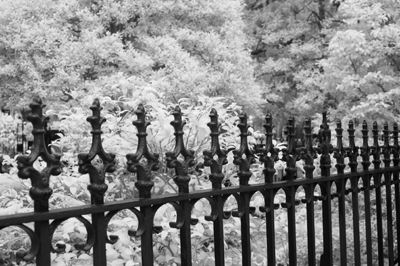 A replica of a pillory in a replica of a Colonial town. My right arm into the right hole, my left arm into the left. My neck went right through the center. I laughed, not because there was anything remotely funny about being hung up in a cross, but just because it felt good to be away from home, school. The marketplace steamed with activity. The worn patch of grass beside the horseblock, the boxwoods by the cobbler’s shop, the flies buzzing above the tidy piles of dung. And it wasn’t any wonder that the faces before me receded in the glare. It wasn’t any wonder that I stopped thinking of my mother and her neck aches, or my father and his call for constant motion whenever he was home from work, even though we never got anything done. I was giving the wood exactly what it wanted. No one was going anywhere. And it was a relief to admit to what was what.
A replica of a pillory in a replica of a Colonial town. My right arm into the right hole, my left arm into the left. My neck went right through the center. I laughed, not because there was anything remotely funny about being hung up in a cross, but just because it felt good to be away from home, school. The marketplace steamed with activity. The worn patch of grass beside the horseblock, the boxwoods by the cobbler’s shop, the flies buzzing above the tidy piles of dung. And it wasn’t any wonder that the faces before me receded in the glare. It wasn’t any wonder that I stopped thinking of my mother and her neck aches, or my father and his call for constant motion whenever he was home from work, even though we never got anything done. I was giving the wood exactly what it wanted. No one was going anywhere. And it was a relief to admit to what was what.
I didn’t think of the other boys once punished like that. I didn’t give a thought to the eggs, fruit, mice, and shit thrown at their faces. There can be no outrage more flagrant, Hawthorne said, than to forbid the culprit to hide his face for shame. But was it shame I felt? I only knew that I was tired of holding myself up. I wanted to cave in and so I caved in. Which was why, after I’d grown used to my new position, I pulled myself out and forgot I had a body.
Or took three steps backward and fell a hard five feet to the ground.
It wasn’t me, then, who dropped like a bale of hay from a burning barn. It wasn’t me lying on my back as the crowd looked on. Or me, for that matter, covering my crotch with my hand, as if I’d already known that they were hungry for murder.
A little girl screamed, and I was relieved to hear that scream tear through the heat.
Relieved, too, to hear my father walking out of the crowd. Relieved to see the arm he raised, for wasn’t that him reaching out to help me up? No, that was the crowd in that arm—I can only see it from here—and he was setting his face for what he didn’t want to do, which was to spank me as one spanks an errant child, not a 12-year-old boy whose voice was on the verge of changing.
Once, twice: who can remember such things? Did I feel it? Did I send myself away? He hit me as the crowd looked on, even as his eyes said, who am I doing this for? Aren’t you my son? He stopped and he blinked, as if he hadn’t known where he’d gone. Then led me to a tool shed on the periphery, where he cleaned off my knee with a handkerchief he’d pulled from his pocket.
I don’t have to say that I spent the rest of the day swimming back and forth across the motel pool until the chlorine stung. I got up. I got up in the way we all get up against the arm that wants to keep us down.
Maybe that’s what my father already knew back then. And maybe that’s why he brought it up at the dinner table thirty years later, though I’d forgotten it, as I’d forgotten many things by then. His eyes looked through me, past me. He spoke as if that memory were just one more thing he’d been wearing around his neck, and the straight-ahead gaze it required of him was no longer serving him at this late hour, what with the bills stacking up on his desk, my mother in Ranmar Gardens, and the empty rooms of the apartment that needed cleaning.
Which was why I didn’t throw the balled-up napkin in my hand, though I’d be lying if I didn’t admit to that temptation. I put my hand over my father’s. And looked away from the face that didn’t need my forgiveness.
—
Paul Lisicky is the author of Lawnboy and Famous Builder, both published by Graywolf Press. His work has appeared in Story Quarterly, Gulf Coast, Hotel Amerika, Subtropics, Five Points, The Pinch, and elsewhere. He’s taught in the graduate writing programs at Cornell, Rutgers-Newark, and Sarah Lawrence. He currently teaches at NYU and in the low residency MFA Program at Fairfield University. He’s finishing up Unbuilt Projects, a collection of short prose pieces.
Photo by Pamela Z. Daum
